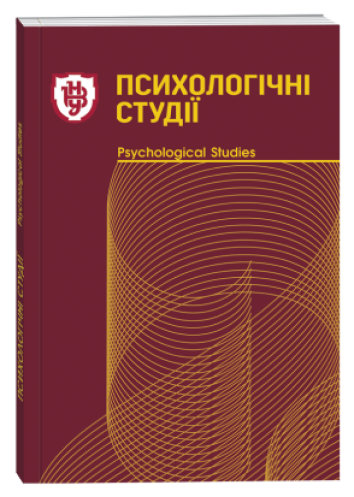SOME FEATURES OF EDUCATIONAL AND PROFESSIONAL MOTIVATION OF MEDICAL STUDENTS AND THEIR INFLUENCE ON FURTHER PROFESSIONAL EDUCATION
DOI:
https://doi.org/10.32782/psych.studies/2024.1.16Keywords:
motive, motivation, educational and professional motivation, professional training (formation)Abstract
In the lives of young people, choosing a future profession is an important and responsible step, the formation of which is influenced by many factors – individual, socio-economic, demographic, etc. At the same time, the process of realizing the professional choice made may last longer and does not always end with admission to the chosen educational institution. Therefore, the contingent of students can differ significantly not only in terms of their level of knowledge, personal characteristics, life experience, but also in their attitude towards fulfilling their duties. The beginning of these qualitative differences should be sought in the earlier stages of the personal development of each student. The school period of his development is especially important, because it is then that stable learning motives are formed as a result of the effective (successful) or ineffective (unsuccessful) educational actions of pupil. Therefore, those students who have always strived for success and self-assertion in their academic work at school, who have developed self-demanding attitudes, self-criticism, and a high level of ambition, tend to adapt very quickly to the university environment and are easily involved in the specifics of the educational process, while obtaining not only high academic results but also moral and psychological satisfaction. All this, no doubt, is an indicator of high academic motivation. A high level of motivation and positive performance in educational and professional activities is a prerequisite for ensuring psychological comfort and confidence in the correctness of the choice made, promotes a clear vision of one's professional career, and makes one's future life prospects predictable. Professional motivation, as an element of students' learning activities in the higher education system, is understood as a set of factors and processes that activate and direct them to master the basics of their future profession. In higher education, the process of professional development of a specialist should be provided with an environment that would facilitate the inclusion of students in various university activities, which would result in a creative attitude to professional activity based on high standards of general personal culture. In this regard, there is a growing need to study the motivation of professional choice of medical students, its content and dynamic characteristics. This should contribute to a more effective and flexible organization of the educational process in a higher education institution, which will consider the individual characteristics of the motivational sphere of medical students, which will allow them to achieve a high level of their educational and professional training and, as a result, ensure their successful medical career in the future.
References
Белей М.Д. Ціннісно-мотиваційні особливості професійного становлення в умовах сучасного ВНЗ. Збірник наукових праць: філософія, соціологія, психологія. 2011. Вип. 16, ч. 2. С. 58–71.
Белей М.Д. Деякі особливості індивідуально-особистісних мотиваційних утворень майбутніх психологів. Психолого-педагогічні умови розвитку освітнього простору держави. Зб. матеріалів Міжн. наук.-практ. конференції. м. Львів, 22 листопада2013 р. / ЛьвДУВС. Львів, 2013. С. 56–61.
Галузяк В.М., Горбунь Е.Л. Проблема формування мотивації учіння студентів. Формування особистості майбутнього вчителя: Науково-методичний збірник. Вінниця. ВДПІ, 1994. С. 49–61.
Галузяк В. М. Психологічні концепції формування навчальної мотивації. Наукові записки Вінницького державного педагогічного університету імені М. Коцюбинського. Серія: «Педагогіка і психологія». 2004. Вип. 11. С. 29–32.
Гилюн О. В. Освітні мотивації студентської молоді. Грані : науково– теоретичний і громадсько-політичний альманах. 2012. Т. 15, № 1 (81). С. 102–104.
Гончаренко С. У. Український педагогічний словник. Київ: Либідь, 1997. 375 с.
Назаренко К. Формування мотивації навчально-пізнавальної діяльності у студентів-філологів на заняттях з іноземної мови. Рідна школа. 2012. № 6. С. 53–57.
Приходько Ю.О., Юрченко В.І. Психологічний словник-довідник: Навч. посіб., 4-те вид., випр. і доп. Київ: Каравела, 2020. 418 с.
Черняк Н. О. Формування мотивації студентів до навчання у ВНЗ. Проблеми інженерно-педагогічної освіти. 2013. № 38–39. С. 388–393.
Климчук В.О., Горбунова В.В. Внутрішня мотивація учбової діяльності молоді: теорія, методика, програма розвитку: монографія. Житомир: Видав ЖДУ ім. І. Франка, 2014. 110 с.
Baeten M., Kyndt E., Struyven K., Dochy F. Using student-centred learning environments to stimulate deep approaches to learning: factors encouraging or discouraging their effectiveness. Educational Research Review: journal. 2010. Vol. 5, №3. p.243–260. https://doi.org/10.1016/j.edurev.2010.06.001
Bosch J., Maaz A., Hitzblech T., Holzhausen Y., Peters H. Medical students’ preparedness for professional activities in early clerkships. BMC Medical Education. 2017. Vol. 17 № 1. p. 140. https://doi.org/10.1186/s12909-017-0971-7
DeCastella K., Byrne D., Covington M. Unmotivated or motivated to fail? A crosscultural study of achievement motivation, fear of failure, and student disengagement. Journal of educational psychology. 2013. Vol. 105, № 3. p. 861–880. https://doi.org/10.1037/a0032464
Seifert T. Understanding student motivation. Educational Research. 2004. Vol. 46, № 2. p. 137–149. https://doi.org/10.1080/0013188042000222421
Wijnia L., Servant-Miklos, V.F.C. Lagging behind the Times: A Brief History of Motivational Discourse in Problem Learning. Advances in Health Sciences Education. 2019. № 24. p. 915–929. https://doi.org/10.1007/s10459-019-09923-3







